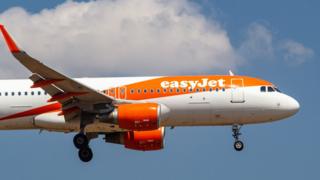EasyJet relaunches package holiday business

Image copyright
Getty Images
EasyJet is relaunching its package holiday business as the airline looks to fill the gap in the industry left by Thomas Cook’s demise earlier this year.
About 20 million people fly with EasyJet to Europe annually but only 500,000 book accommodation through it.
The news came as the carrier reported a 26% fall in pre-tax profits to £427m for the year to 30 September.
EasyJet also said it would become the world’s first major net zero carbon airline by offsetting carbon emissions.
Chief executive Johan Lundgren told BBC Radio 4’s Today programme: “This is not a long-term solution, offsetting is not perfect.
“I don’t think it’s greenwashing, everyone recognises that it works, but this is in addition to the fact that since 2000, we’ve reduced our carbon emissions by 30%.”
He said that the company would take on the £25m cost and added: “That’s not something we’re adding on to ticket prices, which makes us one of the largest carbon emissions offsetting companies in the world.”
‘Not traditional holidays’
Explaining the decision to relaunch its package holidays, EasyJet said in a statement: “The total European package holidays market is worth around £61bn per year. The UK alone is a £13bn market and has grown by 6% annually.
“The way that customers are taking holidays is changing and we know customers want holidays with various durations and not the traditional seven and 14 nights.
“EasyJet is excited about the opportunity to build a major player in the holidays market for a low up-front investment and with limited risk.”
The airline said it had conducted research which showed its customers wanted flexibility in flights and tailored holidays and it had designed its business to respond to this.
EasyJet’s results showed that annual revenues rose 8.3% to £6.4bn, as it increased capacity, but total revenue per seat fell 1.8% to £60.81 due to “some weakness in consumer confidence”.
Passenger numbers for the year rose 8.6% to 96.1 million.

